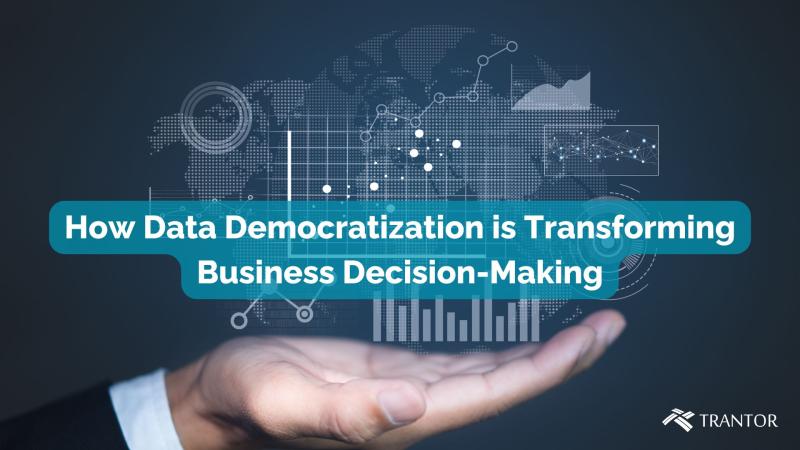How Data Democratization is Transforming Business Decision-Making

In today’s data-driven world, the ability to make informed decisions quickly is crucial for business success. Traditionally, data access and analysis were confined to specialized departments within organizations, often leaving decision-making to a select few. However, this is rapidly changing with the rise of data democratization.
Data democratization is the process of making data accessible to all employees, regardless of their technical expertise, and empowering them to use it to drive decisions. This shift is transforming how businesses operate, fostering a more inclusive and agile environment. Companies like Trantor are at the forefront of this transformation, helping organizations implement data democratization strategies to enhance their decision-making processes.
What is Data Democratization?
Data democratization involves breaking down the barriers that have traditionally restricted access to data. It ensures that data is available, understandable, and usable by everyone in an organization, not just data scientists or IT professionals. This concept is driven by several factors, including advancements in technology, increased awareness of data’s value, and a growing need for faster decision-making.
Key Aspects of Data Democratization:
- Accessibility: Making data easily accessible to all employees through user-friendly tools and platforms.
- Understanding: Ensuring that data is presented in a way that is understandable to non-technical users, often through visualization and intuitive interfaces.
- Empowerment: Providing employees with the skills and tools they need to analyze data and make informed decisions.
- Integration: Ensuring that data from various sources is integrated and available in a cohesive manner.
The Benefits of Data Democratization
1. Enhanced Decision-Making
One of the primary benefits of data democratization is the improvement in decision-making. When data is accessible to everyone in an organization, decisions can be based on comprehensive insights rather than intuition or limited information. Employees can analyze real-time data, identify trends, and make decisions that are grounded in evidence.
2. Increased Agility
In a rapidly changing business environment, agility is essential. Data democratization enables organizations to respond quickly to market changes, customer needs, and emerging opportunities. With data at their fingertips, employees can make decisions faster, test hypotheses, and adapt strategies in real-time.
3. Improved Collaboration
Data democratization fosters collaboration across departments and teams. When data is shared openly, employees from different areas can work together to analyze and interpret it. This cross-functional collaboration can lead to more innovative solutions and a deeper understanding of business challenges.
4. Greater Accountability
When more employees have access to data, accountability increases. Teams and individuals are more likely to take ownership of their decisions and outcomes when they have access to the information that supports their actions. This transparency can lead to better performance and a stronger organizational culture.
5. Empowerment of Employees
Data democratization empowers employees by providing them with the tools and knowledge they need to make data-driven decisions. This empowerment can lead to increased job satisfaction, higher productivity, and a greater sense of ownership and engagement.
Implementing Data Democratization
Implementing data democratization requires a strategic approach and a commitment to creating a data-centric culture. Here are some key steps organizations can take to effectively democratize data:
1. Invest in User-Friendly Tools
To make data accessible to all employees, organizations should invest in user-friendly tools and platforms. Business Intelligence (BI) tools, data visualization software, and self-service analytics platforms are examples of technologies that can help users access and interpret data without needing advanced technical skills.
2. Provide Training and Support
Equipping employees with the skills to analyze and interpret data is crucial for successful data democratization. Organizations should provide training and support to help employees understand how to use data tools, interpret data, and apply insights to their work.
3. Foster a Data-Driven Culture
Creating a data-driven culture involves encouraging employees to use data in their decision-making processes and promoting a mindset that values evidence over intuition. Leadership should model this behavior and support initiatives that promote data literacy and analytical thinking.
4. Ensure Data Quality and Security
While making data accessible is important, ensuring its quality and security is equally critical. Organizations should implement data governance practices to maintain data accuracy, consistency, and privacy. Data security measures must be in place to protect sensitive information while allowing access to authorized users.
5. Integrate Data Sources
For data democratization to be effective, data from various sources must be integrated and presented in a cohesive manner. This integration allows employees to access a comprehensive view of the data, making it easier to analyze and derive insights.
Data Democratization in Action: Case Study
To illustrate the impact of data democratization, let’s consider a hypothetical case study of a retail company that successfully implemented a data democratization strategy.
Background:
A mid-sized retail company was struggling with slow decision-making and a lack of insights into customer behavior. The company’s data was siloed across different departments, and only a few key employees had access to advanced analytics tools.
Implementation:
Invested in BI Tools: The company invested in a Business Intelligence platform that allowed employees to create their own reports and dashboards without needing technical expertise.
Provided Training: The company offered training sessions to employees across departments, teaching them how to use the new tools and interpret data.
Promoted Data-Driven Culture: Leadership encouraged employees to use data in their daily decision-making processes and recognized teams that made impactful data-driven decisions.
Ensured Data Quality: Data governance practices were established to maintain the accuracy and consistency of data across the organization.
Integrated Data Sources: The company integrated data from various sources, including sales, customer feedback, and inventory, into a centralized platform.
Results:
The company saw a significant improvement in decision-making speed and accuracy. Employees across departments were able to access real-time data and make informed decisions. Collaboration increased as teams worked together to analyze data and solve problems. The company also experienced higher customer satisfaction and improved operational efficiency.
The Role of Trantor in Data Democratization
Trantor plays a vital role in helping organizations implement data democratization strategies. As a leader in digital transformation solutions, Trantor assists businesses in selecting and deploying the right tools, developing data governance practices, and fostering a data-driven culture. By leveraging Trantor’s expertise, organizations can effectively democratize their data, driving better decision-making and achieving their business objectives.
Conclusion
Data democratization is transforming how businesses approach decision-making by making data accessible, understandable, and actionable for everyone in the organization. By breaking down data silos and empowering employees to use data, organizations can enhance decision-making, increase agility, improve collaboration, and drive better outcomes.
As the importance of data continues to grow, adopting data democratization practices will become increasingly essential for organizations seeking to stay competitive and thrive in a data-driven world. Companies like Trantor are at the forefront of this transformation, helping businesses harness the power of data to achieve their goals and drive success.


Comments